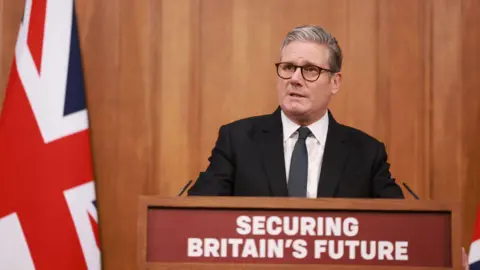**Significant Immigration Cuts Promised by UK Prime Minister**
Recently, Prime Minister Sir Keir Starmer outlined a range of new immigration measures designed to significantly reduce net migration over the next four years. During a press conference in the Downing Street Briefing Room, where he discussed the Immigration White Paper, he characterized these proposals as crucial steps toward regaining control over the UK’s immigration system.
The primary changes include a ban on the recruitment of overseas care workers and stricter regulations related to skilled worker visas. The aim of these adjustments is to address the surging levels of immigration that have drawn considerable political criticism. The government’s Home Office has projected that these newly proposed strategies could potentially result in a drop of approximately 100,000 in annual immigration figures by the year 2029.
In response to the Prime Minister’s proposals, Conservative Leader Kemi Badenoch voiced her skepticism. She argued that Labour’s approach was inadequate, claiming that the changes being suggested did not align with the scale of transformation needed to effectively tackle the existing issues surrounding immigration.
Sir Keir Starmer emphasized that the policies introduced on that day would bring the immigration system “back into control,” asserting that it would become more selective, determine who may enter the country, and ensure fairness within the process. A significant feature of the new measures includes eliminating specialist visas for hiring employees in the health and social care sectors. Firms will now be expected to employ British workers first or extend the permissions of existing foreign staff rather than bringing in new overseas labor.
According to estimates from the Home Office, the move will likely reduce the incoming workforce from outside the UK by around 7,000 to 8,000 individuals annually. Additionally, the costs associated with hiring foreign nationals are set to soar. The government plans to increase the Immigration Skills Charge by 32%, with smaller companies obliged to pay up to £2,400 for each foreign worker they sponsor, and larger firms facing fees up to £6,600. Furthermore, the government is contemplating the introduction of a tax for every international student enrolled in UK universities, with the revenue aimed at enhancing skills training programs.
The implications for educational institutions are also crucial, as stricter entry requirements will apply. Colleges must meet heightened thresholds, expecting at least 95% of international students to commence their courses and anticipate that 90% will see them through to completion.
Under these new provisions, applicants for skilled worker visas would generally require a degree-level qualification, reverting changes made during Boris Johnson’s administration, which previously accepted qualifications at the A-level equivalent. While this alteration raises concerns about the impact on workforce availability, exceptions will remain for sectors with persistent shortages or those aligned with the government’s industrial strategy, although specific roles have yet to be finalized.
The proposed policy changes come against a backdrop of record-high net migration figures. As of June 2023, net migration hit a staggering 906,000, with the previous year recording 728,000. Sir Keir criticized sectors that he felt were too reliant on importing foreign labor and called for a commitment to investing in the skills of the local population.
While Sir Keir Starmer pledged that net migration would decrease under his leadership significantly, he did not guarantee that this trend would continue each year. He also stated, “If we need to do more to relieve pressure on housing and public services, mark my words, we will.”
Political reactions to Labour’s immigration plan have been varied. While the Conservatives advocated for a parliamentary binding migration cap, the Liberal Democrats stressed the importance of having a coherent strategy for recruiting British workers. Reform UK leader Nigel Farage described Labour’s adjustments as an indication of panic in light of his party’s rising influence, while the Green Party condemned the proposals as a misguided attempt to appease certain voter bases.
As these planned reforms unfold, they have the potential to reshape the immigration landscape in the UK significantly, influencing both the economy and the societal dynamics surrounding immigration in the years to come.



